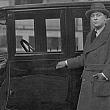Using the HOLC Map of Grand Rapids
The Home Owner’s Loan Corporation, after it had finished providing emergency loans and mortgages between 1933 and 1935, went back through its portfolio to assess the long-term outlook for 239 major urban areas. The HOLC, through its state branch office, engaged the services of local realtors, appraisers, and lawyers to survey the city’s neighborhoods. The map created from their survey used a four-tiered system of assessment that took a variety of factors into account. The survey documents stated that:
“In establishing the grade of an area, such factors as these are considered: intensity of the sale and rental demand; percentage of home ownership; age and type of building; economic stability of area; social status of the population; sufficiency of public utilities, accessibility of schools, churches, and business centers; transportation methods; topography of the area; and the restrictions set up to protect the neighborhood. The price level of the home is not the guiding factor.”
Despite the harsh wording, the HOLC did not use this statement to determine lending as its work had finished by the time the City Survey project started. Nor, did the surveys mean that good loans were not possible in the lowest two categories, merely that the HOLC thought loans there required a different kind of servicing. These maps are examples of the type of long-term thinking that the HOLC, local banks and realtors, municipalities, and the Federal Housing Administration (FHA) started using in the aftermath of the Great Depression.
First Grade or A rating - signified by green on the map (descriptions from HOLC Map)
“The First Grade or A areas are “hot spots”; they are not yet fully built up. In nearly all instances they are the new, well-planned sections of the city, and almost synonymous with the areas where good mortgage lenders with available funds are willing to make their maximum loans to be amortized over a 10-15 year period -- perhaps up to 75-80% of the appraisal. They are homogenous; in demand as residential locations in “good times” or “bad”; hence on the up grade.”
Second Grade or B rating - signified by blue on the map
“The Second Grade or B areas, as a rule, are completely developed. They are like a 1935 automobile -- still good, but not what the people are buying today who can afford a new one. They are the neighborhoods where good mortgage lenders will have a tendency to hold loan commitments 10-15% under the limit.”
Third Grade or C rating - signified by yellow on the map
“Third Grade or C areas are characterized by age, obsolescence, and change of style; expiring restrictions or lack of them; infiltration of a lower grade population; the presence of influences which increase sales resistance such as inadequate transportation, insufficient utilities, perhaps heavy tax burdens, poor maintenance of homes, etc. “Jerry” built areas are included, as well as neighborhoods lacking homogeneity. Generally, these areas have reached the transition period. Good mortgage lenders are more conservative in the Third Grade or C areas and hold loan commitments under the lending ratio for the A and B areas.”
Fourth Grade or D ratings - signified by red on the map
“The Fourth Grade or D areas represent those neighborhoods in which the things that are now taking place in the C neighborhoods, have already happened. They are characterized by detrimental influences to a pronounced degree, undesirable population or an infiltration of it. Low percentage of homeownership, very poor maintenance, and often vandalism prevail. Unstable incomes of the people and difficult collections are usually prevalent. The areas are broader than the so-called neighborhoods and others will lend only on a conservative basis.”
Diagonal lines across a section
Indicates sparsely settled areas; the color specifies the grade.
Grid lines across a section
Indicates industrial and commercial areas and are not color coded.
Taken as a whole, the maps and survey sheets reveal what local bankers, realtors, and appraisers viewed as the long-term trends for the city in 1937. This outlook would influence the preference for new construction in carefully planned areas, the direction of expressways, and the effort to restrict and isolate ethnic and minority communities within particular areas. While certainly not alone, the HOLC map offers a window into the mindset of the 1930s.
A few hints for those unfamiliar with using and moving about Google maps.
1. If you click on any coded section of the map an information box appears.
- More information (pdf) - will bring up the survey document for that neighborhood.
- Directions for using the map - will bring you back to this document.
2. You can move around the map by using the directional arrows at the top left of the map. You can also move the map when you “mouse down” and move your mouse.
3. If you wish to return to the original view of the map, click on the hand icon in the center of the directional arrows at the top left of the map.
4. To make the map larger or smaller click on the + or – signs at the left of the map. Double clicking will also enlarge the map and bring up the information box.
5. The Legend for color coding is in the lower left corner of the map.
6. Street names are legible when the map is magnified, but the finding codes are not applicable to this map.

 facebook
facebook



